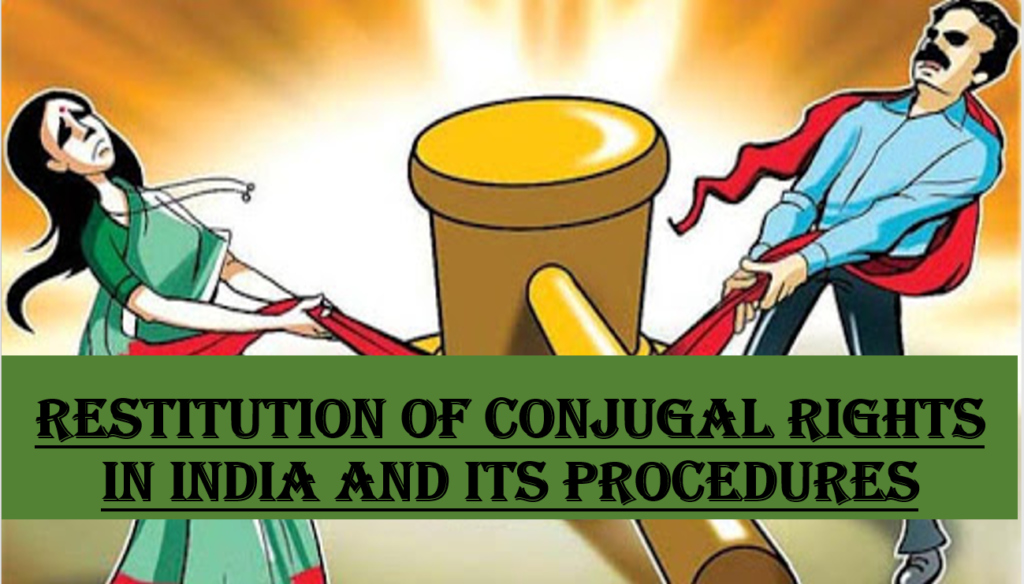
Introduction
The Concept of Restitution of Conjugal Rights in India is a legal remedy available to a married person whose spouse has deserted them without any reasonable cause. This remedy allows the spouse to petition the court to order the other spouse to resume cohabitation and marital relations. The concept of Restitution of Conjugal Rights is enshrined in Section 9 of the Hindu Marriage Act, 1955, which applies to Hindus, Buddhists, Jains, and Sikhs.
The basic idea behind Restitution of Conjugal Rights is to promote marital harmony and ensure that spouses fulfill their marital obligations towards each other. It is based on the premise that the marital bond is sacred and that spouses have a duty to live together and discharge their marital obligations. However, Restitution of Conjugal Rights is a controversial remedy and has been criticized for violating the right to privacy and autonomy of the parties.
Procedure for filing for Restitution of Conjugal Rights
To file a petition for RCR, the petitioner has to satisfy the following conditions:
- The petitioner must be a legally married person.
- The petitioner’s spouse must have deserted the petitioner without any reasonable cause.
- The petitioner must have lived separately from the spouse for a continuous period of not less than two years immediately preceding the presentation of the petition.
The petition has to be filed in the appropriate family court having jurisdiction over the matter. The petition must contain the following details:
- The names and addresses of the petitioner and the respondent (spouse).
- The date and place of the marriage.
- The grounds on which the petition is being filed, i.e., the respondent’s desertion of the petitioner without any reasonable cause.
- The period of separation between the petitioner and the respondent.
- The relief sought, i.e., an order for the restitution of conjugal rights.
Once the petition is filed, the court will issue a notice to the respondent asking them to appear in court and file a written reply to the petition. If the respondent fails to appear in court or fails to file a written reply, the court may proceed ex-parte and pass an order in favor of the petitioner.
If the respondent appears in court and contests the petition, the court will conduct a trial and hear both parties’ arguments. The court will also consider any evidence produced by the parties, such as documents, witnesses, or other evidence.
If the court is satisfied that the respondent has deserted the petitioner without any reasonable cause, it may pass an order for the restitution of conjugal rights. The order will direct the respondent to resume cohabitation with the petitioner and fulfill their marital obligations. The court may also impose any other conditions it deems fit, such as counseling or mediation.
If the respondent fails to comply with the court’s order, the petitioner may file an application for the enforcement of the order. The court may then take appropriate action, such as imposing penalties or issuing warrants for the respondent’s arrest.
Case laws related to Restitution of Conjugal Rights
Over the years, there have been several judgements by Indian courts dealing with the concept of RCR. Some of the key judgements are as follows:
- Saroj Rani v. Sudarshan Kumar Chadha (1984): This landmark judgement by the Supreme Court held that RCR is not a matrimonial remedy but a personal remedy aimed at enforcing the legal obligations of the parties. The court also held that RCR cannot be granted by force, and the parties must voluntarily resume cohabitation.
- Smt. Sunita Kumari v. Dr. Sanjay Kumar (2002): In this case, the High Court of Punjab and Haryana held that RCR is a discretionary remedy and should be granted only if the court is satisfied that the petitioner has made efforts to bring about reconciliation between the parties.
Conclusion
In conclusion, Restitution of conjugal Rights is a legal remedy available to married persons in India, aimed at promoting marital harmony and ensuring that spouses fulfill their marital obligations towards each other. While it has its critics, Restitution of conjugal Rights remains an important legal tool for resolving marital disputes and restoring marital relations.
If the court is satisfied that the respondent/one of the spouse has deserted the petitioner without any reasonable cause, it may pass an order for the restitution of conjugal rights. The order will direct the respondent to resume cohabitation with the petitioner and fulfill their marital obligations. The court may also impose any other conditions it deems fit, such as counseling or mediation.
Over the years, there have been several judgements by Indian courts dealing with the concept of Restitution of conjugal Rights. These judgements have clarified various aspects of Restitution of conjugal Rights, such as its discretionary nature, the need for voluntary cohabitation, and the importance of reconciliation between the parties.
